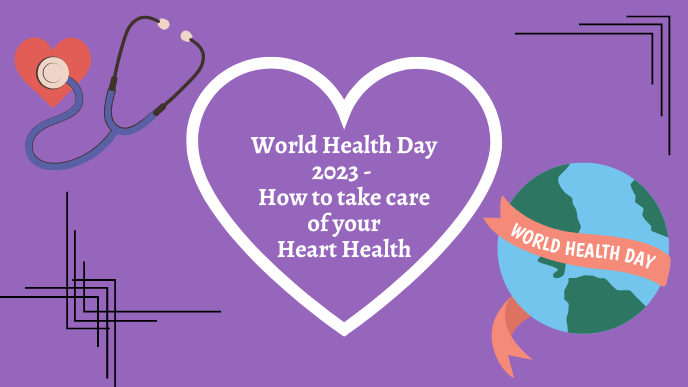
Every year 7th April is observed as World Health Day. First initiated by WHO in the year 1949 by WHO, it is now a global inventiveness aimed at raising awareness and advocating for healthcare issues affecting communities worldwide.
The theme for World Health Day this time is ‘Health For All’.
When talking about health, how can one not mention the significance of HEART health, especially after the heart-wrenching era of Covid! The period has been heartbreaking for the 520 million people living with CVD. Many people became isolated from friends and family because they were afraid to attend routine and emergency appointments.
As a result, the COVID-19 pandemic has highlighted the critical importance of investing in cardiovascular health and its preparedness.
You can begin to make lifestyle changes at any point of time in your life to have a healthier beating heart! It’s never too late.
On this occasion of World Health Day, here are some practical steps as to how to protect your heart and keep it pumping for the longest!
Consume a heart-healthy diet
A heart-healthy diet includes a variety of foods such as vegetables, whole grains, fruits, legumes, and nuts. Reduce your intake of salty meats like ham, bacon, tocino, sausage, and hotdogs, as well as salty foods like dried fish. Avoid consuming processed, canned, or fast food. Sweetened snacks such as doughnuts, cookies, and foods alike should be replaced with fresh fruit and vegetables, and when thirsty, sweetened beverage sodas and sweetened juices should be replaced with water.
Lose weight if you are overweight
Overweight and obesity are defined as having a body mass index (BMI) of 25 or higher. CCentral obesity (adiposity) is defined as a large waist circumference that is more than 80 cm for females whereas more than 90 cm for males. Try to cut 500 kilocalories from your daily diet to achieve an average weight loss of half to nearly one kilogramme per week.
Increase your weekly physical activity to at least 2.5 hours.
Physical activity helps to improve blood pressure, cholesterol and other blood lipid levels, and weight control. Some physical activity is preferable to none. People who are inactive can begin with small amounts of physical activity.
Adults should inculcate at least 150 minutes of moderate physical activity per week in their daily routine (for instance; brisk walking, climbing stairs, dancing, gardening, or doing household chores that cause a mild increase in heart rate).
Quit Tobacco
Tobacco use and second-hand smoke exposure are both harmful to your heart. Quitting smoking is the most significant health gift you can give your heart, with immediate and long-term health benefits that include living up to ten years longer. After a year of not smoking, the risk of developing heart disease is roughly half that of a smoker. The risk of heart disease is the same 15 years after quitting as it is for a non-smoker.
Avoid Alcohol
It is noteworthy that more than 200 disease and injury conditions, including cardiovascular disease, have been linked to alcohol consumption. While most Filipinos report drinking alcohol on an infrequent basis, binge drinking is common in the country. There is no safe parameter of alcohol consumption, so it is best to avoid it altogether to protect your heart.
Have your blood pressure and blood sugar levels checked on a regular basis
Regular blood pressure and blood sugar check by a healthcare provider is an important way to maintain a healthy heart. Even if you have high blood pressure, you may not notice any symptoms, which can be dangerous to your heart. It is also critical to consult with your health care provider if you have behavioural risks.
Set goals with your doctor if you have hypertension or diabetes, and take your medications on a regular basis. Involve your family and friends in your quest for a healthier heart.
We recommend you take utmost care of your heart!
PPCC (Poona Preventive Cardiology Center), being utterly dedicated to cardiovascular diseases and their treatment, urges everyone on this World Health Day to take care of our hearts before it’s too late. Taking small steps like eating a healthier diet, exercising regularly and getting enough sleep can make a significant difference in your overall health and well-being. Make sure you pay attention to any signs or symptoms that may suggest heart trouble, and reach out for help accordingly.
Want to know more about how to protect your heart?
Our specialists at PPCC are always there to help you out with tips on how you can have a healthy heart with a combination of preventive measures and lifestyle changes.
We strive to provide the best care and non-surgical treatment methods for cardiovascular diseases. We believe that it is important to remain up-to-date on medical advancements and research in order to better serve our patients. Our team of specialists works closely with each patient to ensure they receive the highest quality of care tailored specifically to their needs.
Contact us today!
HAPPY WORLD HEALTH DAY!


